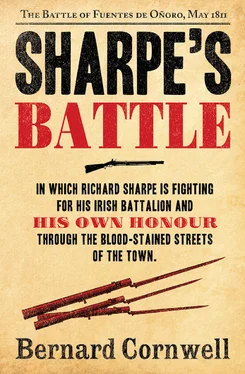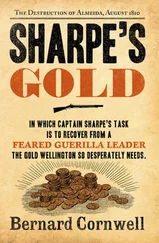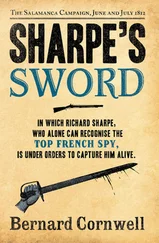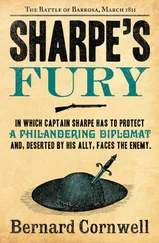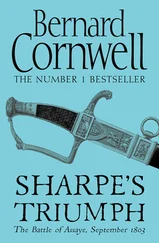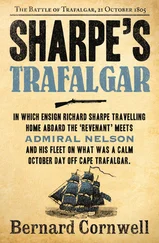‘Birth,’ Donaju said. He was a pale, thin man with a worried face who looked more like an impoverished student than a soldier, but of all the officers in the Real Compañía Irlandesa he seemed the most promising. ‘You can’t have a royal guard commanded by a commoner, Sharpe,’ Donaju said with a touch of sarcasm, ‘but when Kiely’s sober he can be quite impressive.’ The last sentence contained no sarcasm at all.
‘Impressive?’ Sharpe asked dubiously.
‘He’s a good swordsman,’ Donaju replied. ‘He detests the French, and in his heart he would like to be a good man.’
‘Kiely detests the French?’ Sharpe asked without bothering to disguise his scepticism.
‘The French, Sharpe, are destroying Kiely’s privileged world,’ Donaju explained. ‘He’s from the ancien régime , so of course he hates them. He has no money, but under the ancien régime that didn’t matter because birth and title were enough to get a man a royal appointment and exemption from taxes. But the French preach equality and advancement on merit, and that threatens Kiely’s world so he escapes the threat by drinking, whoring and gambling. The flesh is very weak, Sharpe, and it’s especially feeble if you’re bored, under-employed and also suspect that you’re a relic of a bygone world.’ Donaju shrugged, as though ashamed of having offered Sharpe such a long and high-minded sermon. The Captain was a modest man, but efficient, and it was on Donaju’s slender shoulders that the day-to-day running of the guard had devolved. He now told Sharpe how he would attempt to stem the desertions by doubling the sentries and using only men he believed were reliable as picquets, but at the same time he blamed the British for his men’s predicament. ‘Why did they put us in this godforsaken place?’ Donaju asked. ‘It’s almost as if your General wants our men to run.’
That was a shrewd thrust and Sharpe had no real answer. Instead he mumbled something about the fort being a strategic outpost and needing a garrison, but he was unconvincing and Donaju’s only response was to politely ignore the fiction.
For the San Isidro Fort was indeed a godforsaken place. It might have had strategic value once, but now the main road between Spain and Portugal ran leagues to the south and so the once huge fastness had been abandoned to decay. Weeds grew thick in the dry moat that had been eroded by rainfall so that the once formidable obstacle had become little more than a shallow ditch. Frost had crumbled the walls, toppling their stones into the ditch to make countless bridges to what was left of the glacis. A white owl roosted in the remains of the chapel’s bell tower while the once-tended graves of the garrison’s officers had become nothing but shallow declivities in a stony meadow. The only serviceable parts of San Isidro were the old barracks buildings that had been kept in a state of crude repair thanks to the infrequent visits of Portuguese regiments which had been stationed there in times of political crisis. During those crises the men would block the holes in the barracks walls to protect themselves from the cold winds, while the officers took up quarters in the twin-towered gatehouse that had somehow survived the years of neglect. There were even gates that Runciman solemnly ordered closed and barred each night, though employing such a precaution against desertion was like stopping up one earth of a mighty rabbit warren.
Yet, for all its decay, the fort still held a mouldering grandeur. The impressive twin-towered gateway was embellished with royal escutcheons and approached by a four-arched causeway that spanned the only section of the dry moat still capable of checking an assault. The chapel ruins were laced with delicate carved stonework while the gun platforms were still hugely massive. Most impressive of all was the fort’s location for its ramparts offered sky-born views deep across shadowy peaks to horizons unimaginable distances away. The eastern walls looked deep into Spain and it was on those eastern battlements, beneath the flags of Spain and Britain, that Lord Kiely discovered Sharpe on the third morning of the guard’s stay in the fort. It seemed that even Kiely had become worried about the rate of desertion. ‘We didn’t come here to be destroyed by desertion,’ Kiely snapped at Sharpe. The wind quivered the waxed tips of his moustaches.
Sharpe fought back the comment that Kiely was responsible for his men, not Sharpe, and instead asked his Lordship just why he had come to join the British forces.
And, to Sharpe’s surprise, the young Lord Kiely took the question seriously. ‘I want to fight, Sharpe. That’s why I wrote to His Majesty.’
‘So you’re in the right place, my Lord,’ Sharpe said sourly. ‘The Crapauds are just the other side of that valley.’ He gestured towards the deep, bare glen that separated the San Isidro from the nearest hills. Sharpe suspected that French scouts must be active on the valley’s far side and would already have seen the movement in the old fort.
‘We’re not in the right place, Sharpe,’ Kiely said. ‘I asked King Ferdinand to order us to Cadiz, to be in our own army and among our own kind, but he sent us to Wellington instead. We don’t want to be here, but we have royal orders and we obey those orders.’
‘Then give your men a royal order not to desert,’ Sharpe said glibly.
‘They’re bored! They’re worried! They feel betrayed!’ Kiely shuddered, not with emotion, but because he had just risen from his bed and was still trying to shake off his morning hangover. ‘They didn’t come here to be trained, Sharpe,’ he snarled, ‘but to fight! They’re proud men, a bodyguard, not a pack of raw recruits. Their job is to fight for the King, to show Europe that Ferdinand still has teeth.’
Sharpe pointed east. ‘See that track, my Lord? The one that climbs to that saddle in the hills? March your men up there, keep them marching for half a day and I’ll guarantee you a fight. The French will love it. It’ll be easier for them than fighting choirboys. Half your men don’t even have working muskets! And the other half can’t use them. You tell me they’re trained? I’ve seen militia companies better trained in Britain! And all those plump militia bastards do is parade in the market place once a week and then beat a retreat to the nearest bloody tavern. Your men aren’t trained, my Lord, whatever you might think, but you give them to me for a month and I’ll have them sharper than a bloody razor.’
‘They’re merely out of practice,’ Kiely said loftily. His immense pride would not let him concede that Sharpe was right and that his vaunted palace guards were a shambles. He turned and gazed at his men who were being drilled on the weed-thick flagstones of the fort’s plaza. Beyond the company, hard by the gatehouse towers, grooms were bringing saddled horses ready for the officers’ midday exercises in horsemanship, while just inside the gate, on a stretch of smooth flagstones, Father Sarsfield was teaching the catechism to some of the company’s children. The learning process evidently involved a deal of laughter; indeed, Sharpe had noticed, wherever the chaplain went, good humour followed. ‘If they were just given an opportunity,’ Kiely said of his men, ‘they’d fight.’
‘I’m sure they would,’ Sharpe said, ‘and they’d lose. What do you want of them? Suicide?’
‘If necessary,’ Kiely said seriously. He had been staring east into enemy-held country, but now looked Sharpe in the eye. ‘If necessary,’ he said again, ‘yes.’
Sharpe gazed at the dissolute, ravaged young face. ‘You’re mad, my Lord.’
Kiely did not take offence at the accusation. ‘Would you call Roland’s defence of Roncesvalles the suicide of a madman? Did Leonidas’s Spartans do nothing but throw away their lives in a fit of imbecility? What about your own Sir Richard Grenville? Was he just mad? Sometimes, Sharpe, a great name and undying fame can only come from a grand gesture.’ He pointed at the far hills. ‘There are three hundred thousand Frenchmen over there, and how many British here? Thirty thousand? The war is lost, Sharpe, it is lost. A great Christian kingdom is going down to mediocrity, and all because of a Corsican upstart. All the glory and the valour and the splendour of a royal world are about to become commonplace and tawdry. All the nasty, mean things – republicanism, democracy, equality – are crawling into the light and claiming that they can replace a lineage of great kings. We are seeing the end of history, Sharpe, and the beginnings of chaos, but maybe, just maybe, King Ferdinand’s household guard can bring the curtain down with one last act of shining glory.’ For a few seconds the drunken Kiely had betrayed his younger, nobler self. ‘That’s why we’re here, Sharpe, to make a story that will still be told when men have forgotten the very name of Bonaparte.’
Читать дальше
